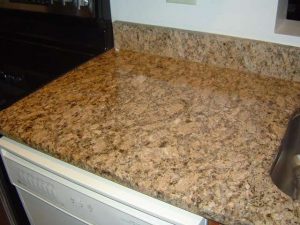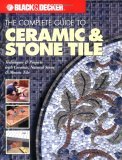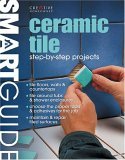Granite Sealers Protect your Granite Countertops from Staining and Corroding
By Mark J. Donovan
|
|
It is important to periodically apply a granite sealer to your granite countertops to prevent them from absorbing liquids that can stain them. Granite sealers are not all the same, however. Likewise, granite countertops are not all the same and so it is important to first understand what type of granite countertops you have. For example, granite countertops vary in color, porousness and finish. In general, the darker the granite countertop the less frequently it will require sealing. Likewise, if it has a very polished surface it probably needs to be sealed less frequently.
On the other hand, the more lighter in color and porous a granite countertop is the more often it will require sealing. A porous surface is very absorbent to liquids which results in staining, and lighter color granites more easily shows stains. |
Other types of granite countertops that include calcite leave them susceptible to corroding or etching if exposed to acids such as orange and lemon juice, or coffee.
Granite Sealer Types
In regards to granite sealer types, it is important to first understand that granite sealers only slow down the rate of penetration of a liquid into the granite countertop. Consequently, it is always wise to clean up spilled liquids on granite or other stone countertops as soon as possible. This said sealing a countertop gives you more time before needing to wipe up the countertop to prevent staining.
| There are two basic kinds of granite sealers on the market, penetrating granite sealers and topical granite sealers. Granite sealers vary in life span so in general the longer the lifespan warranted by the product the better it should be for preventing staining. Penetrating granite sealers are a resin based sealer, that as the name suggests, penetrates into the microscopic cracks and cavities of the countertop. There are different types of resin used in penetrating, or impregnable, granite sealers. The different resin types can protect the granite countertops differently as it relates to spilled liquid types. Penetrating granite sealers, however, do not protect the top surfaces of the countertops from corroding or etching. |  |
Topical granite sealers are thin film coatings that are easily applied to granite countertops. They help protect the countertops from staining, scuffing, corroding, etching and scratching. However, due to the fact that they are a thin film, they wear out quickly and thus need to be reapplied more often than a penetrating granite sealer. Applying a topical granite sealer periodically in between deep penetrating granite sealer applications is an excellent way to prevent corroding or etching if your granite countertops have calcite in them.
| Testing Granite Countertops for Sealing
It is also important to not apply granite sealers too often to granite countertops. Consequently, before applying a granite sealer you should first test the countertop to see if it indeed does need sealing. Test your granite countertops for sealing by applying three small penny-size dabs of water, lemon juice, and vegetable oil on the granite countertop in an obscured, or normally covered, location. |
 |
If after only a few minutes you notice that the granite countertop darkens under the test dabs then you should apply a penetrating granite sealer as the granite is quite porous.
If after 5-10 minutes the dabbed areas darken just slightly, then you probably only need to apply a topical granite sealer. If the test dabs do not darken after 15 minutes or so, then you do not need to apply any granite sealer. After performing the test, wipe the residual water, lemon juice, and oil off of the countertop and apply the granite sealer if necessary.
Applying Granite Sealers
Sealing granite countertops is easy to do, however, make sure to thoroughly read the instructions on the granite sealer before applying it. Also, it is important that the countertops are completely free of dust, dirt, grime and liquids, so make sure to clean and dry them thoroughly before applying the sealer.
To seal granite countertops use a clean rag or brush to apply the granite sealer to a small area of the countertop, e.g. 6 to 8 square feet area. Then let it set in and absorb into the countertop for a few minutes per the granite sealer manufacturer’s recommendations. When the sealer is nearly dry apply a second application and rub it in thoroughly with a clean rag. Continue in this manner to seal the entire countertop. Also, if you are applying a penetrating granite sealer, you may want to follow up afterwards with a topical granite sealer if you’ve confirmed your countertops have calcite in them.
For information on installing a shower pan membrane liner for a ceramic tile shower, see the Shower Pan Membrane Liner Installation Ebook from HomeAdditionPlus.com. The Shower Pan Membrane Liner EBook will quickly teach you the step-by-step process for installing the shower pan membrane liner correctly. It includes instructions on framing the shower stall, pouring the pre-slope and shower base mortar, and installing the shower pan membrane liner.
See HomeAdditionPlus.com’s Ceramic Tile Calculator
See my “How to Tile a Custom Ceramic Tile Shower” Ebook to learn how to tile your own shower: For a detailed set of instructions on tiling a shower floor and walls, including pictures for every step in the process, see my “How to Tile Custom Ceramic Tile Shower Ebook”.
Related Information
Additional Ceramic Tile Resources from Amazon.com
 |
 |
 |
Get Free Kitchen Remodeling Price Quotes with No Obligation!
Fill out our 3-5 minute quick and easy form, and receive a free price quote on a kitchen remodeling project from one of our pre-screened and licensed kitchen remodeling contractors. This process is free and there is no obligation to continue once you receive your kitchen remodel price estimate.
